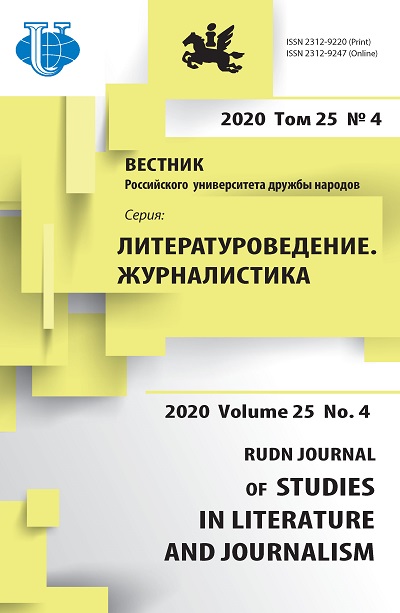Orientalism poetics: story by Leonid Solovyov “The Nomad”
- Authors: Shafranskaya E.F.1, Volokhova T.V.1
-
Affiliations:
- Moscow City Pedagogical University
- Issue: Vol 25, No 4 (2020)
- Pages: 648-656
- Section: LITERARY CRITICISM
- URL: https://journals.rudn.ru/literary-criticism/article/view/25450
- DOI: https://doi.org/10.22363/2312-9220-2020-25-4-648-656
- ID: 25450
Cite item
Full Text
Abstract
The article deals with the problem of orientalism in literature, narrowed to the question of “Russian orientalism” and its Soviet derivation. The names of Nikolai Karazin and Andrey Platonov are mentioned among Russian literary Orientalists. The researchers identify the differences between Soviet Orientalism and the Orientalism of the XIX century. The analytical paradigm presented in the article outlines the prospects for the scientific study of “Uzbek impressions. Salir-Gul” (1933) by Sigismund Krzyzanowski and Pavel Zaltzman's novel “Central Asia in the Middle Ages” (1930s). For the first time, the novel “The nomad” (“Kochevye”) by the Russian writer of the twentieth century Leonid Solovyov written in 1929 and published in 1932 is analyzed in detail. Appeal to the folklore, ceremonial, and ritual life of the peoples of Central Asia becomes one of the main techniques of Leonid Solovyov's Oriental poetics. Solovyov's narrator is not a traditional orientalist observer of an alien, and therefore exotic, picture of the world. In Solovyov's poetics, the subject of the story merges with its object and represents a single whole: Russian literature spoke in the voice of a stranger. The material of the article corresponds to the intentions outlined in modern postcolonial studies.
About the authors
Eleonora F. Shafranskaya
Moscow City Pedagogical University
Author for correspondence.
Email: shafranskayaef@mail.ru
Doctor of Philology, Professor of the Department of Russian Literature
4 2-oi Selskokhozyaystvennyi Dr, Moscow, 129226, Russian FederationTatyana V. Volokhova
Moscow City Pedagogical University
Email: tvvolokhova@gmail.com
graduate student of the Department of Russian Literature
4 2-oi Selskokhozyaystvennyi Dr, Moscow, 129226, Russian FederationReferences
- Shafranskaya, E.F. (2016). Turkestanskij tekst v russkoj kulture: Kolonialnaja proza Nikolaja Karazina (istoriko-literaturnyj i kulturno-jetnograficheskij kommentarij) [The Turkestan text in the Russian culture: Colonial prose of Nikolay Karazin (historico-literary and cultural and ethnographic comment)]. Saint Petersburg, Svoe izdatelstvo Publ.
- Kolcova, I.V. (1980). Po sledam Nasreddina: Dilogija L. Soloveva o Hodzhe Nasreddine [In the wake of Nasreddin: L. Solovyov's dilogy about Hodge Nasreddin]. Tashkent, Izdatel'stvo literatury i iskusstva imeni Gafura Gulyama Publ.
- Volokhova, T.V. (2019). On mechtal stat dervishem: Biografija Leonida Soloveva [He dreamed to become a dervish: Biography of Leonid Solovyov]. “Neuzheli kto-to vspomnil, chto my byli…” Zabytye pisateli [“Really someone remembered that we were…” The Forgotten writers]: Collection of scientific articles (pp. 185–199). Saint Petersburg, Svoe izdatelstvo Publ.
- Rejtblat, A.I. (2020). “Orientalizm” i russkij orientalizm (obzor knig po orientalizmu v russkih vostokovedenii i literature) [“Orientalism” and the Russian orientalism (the review of books on orientalism in Russians oriental studies and literature)]. Novoe literaturnoe obozrenie [New literary review], 1(161), 392–400.
- Karazin, N.N. (2019). Na dalekih okrainah. Pogonja za nazhivoj [On the far outskirts. Pursuit of a profit]: Novels. Moscow, Nauka Publ.
- Shafranskaya, E.F. (2019). “Karazin! Azija!” [“Karazin! Asia!”]. In N.N. Karazin, Na dalekih okrainah. Pogonja za nazhivoj [On the far outskirts. Pursuit of a profit]: Novels (pp. 525–596). Moscow, Nauka Publ.
- Karazin, N.N. (1875). Skazka o zhenskom hanstve: Otryvok iz zapisnoj knizhki [Tale of the female khanate: A fragment from the notebook]. Drevnjaja i novaja Rossija [Ancient and new Russia], 3(11), 290–294.
- Karazin, N.N. (1880). Kara-Dzhigit: Bylina sredneaziatskih kochevnikov [Cara Dzhigit: Bylina by the Central Asian nomads]. Niva, (40), 794–800.
- Platonov, A. (1983). Dzhan [Gian]: Story. In A. Platonov, Izbrannye proizvedenija [Chosen works] (pp. 396–506). Moscow, Ekonomika Publ.
- Solovev, L.V. (2010). The Nomad [Kochevye]: Story. In L.V. Solovev, Sobranie sochinenij [Collected works] (vol. 3, pp. 197–366). Moscow, Knigovek Publ.
- Korman, B.O. (1981). Celostnost literaturnogo proizvedenija i jeksperimentalnyj slovar literaturovedcheskih terminov [Integrity of the literary work and experimental dictionary of literary terms]. Problemy istorii kritiki i pojetiki realizma [Problems of history of criticism and poetics of realism]: Interuniversity collection (pp. 39–54). Kujbyshev, Kujbyshevskij gosudarstvennyj universitet Publ.
- Vitkovich, V.S. (1983). Krugi zhizni: Povest v pismah [Life circles: The story in letters]. Moscow, Molodaja gvardija Publ.
Supplementary files















